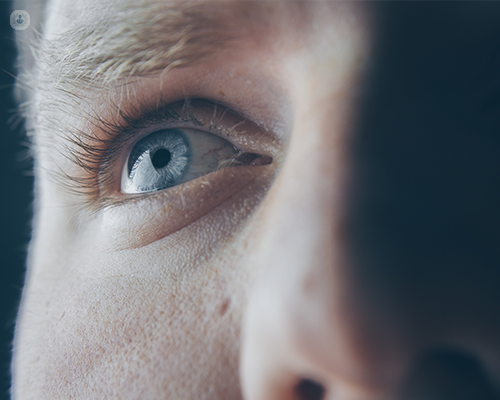Eye health, clinic visits and eye surgeries during the COVID-19 pandemic
Written by:If your vision is causing doubts, don’t hesitate to get your eyes checked during the COVID-19 pandemic. Despite the crisis, eye check-ups and urgent surgeries are going ahead, and will gradually increase as the restrictions from the virus are lifted. Mr Alistair Laidlaw, a consultant ophthalmologist, assures you of the measures being taken to minimise the risk of catching the virus in eye clinics, stresses the importance of getting your eyes checked and explains how common surgeries like cataracts will start up again during June 2020.

Can COVID-19 transmission happen through the eyes?
Some patients with the novel coronavirus COVID-19 have been reported to suffer from conjunctivitis, which has symptoms of sticky and red eyes. If that is the case, then the virus could be transmitted to someone else from the eyes via a patient’s fingers. However, this does not appear to be a common source of cross-infection, unlike with some other viral conjunctivitis diseases that can be very infectious. The general rule (and a very good rule) is that if you think you have COVID-19, you should self-isolate.
How is ophthalmology treatment being affected during the pandemic?
Emergency eye conditions are still being treated in both the private sector and the NHS. So, there is no reason for people to suffer irreversible harm from eye conditions that need urgent attention during the COVID-19 pandemic.
A worrying trend is that the number of people turning up daily with a potentially blinding eye disease has gone down to almost a third, which means that people can be sitting at home losing vision from potentially treatable blinding eye diseases. Many patients appear to be scared of going to see a doctor or going to the hospital because of the risk of catching COVID-19. It is very important to stress that everything that can possibly be done to prevent the spread of COVID-19 in eye clinics has been implemented: doctors and other healthcare professionals are wearing full PPE, everything is being scrupulously disinfected between patients and both patients and staff are being kept adequately apart. It is very good advice to seek medical help if you are worried that there is something wrong with your vision. Many opticians are now opening their doors again for urgent cases. You can also arrange to have a telephone consultation to discuss the problem before visiting an eye clinic.
Are cataract surgeries possible during the pandemic?
In the early stages of the pandemic, only people with eye conditions that lead to irreversible harm if not treated promptly were undergoing treatment. It is unusual for patients with cataract to fall into that category, but there are some cases where they do:
- people whose vision has quickly declined
- people who are at risk of hurting themselves because of poor vision
This is the case in both the NHS and private sector.
From the beginning of June 2020 (provided the COVID-19 pandemic continues to be in decline in the UK), services for conditions such as cataract will start to open up again. Social distancing rules and some changes in the way in which we perform surgery will mean that the same number of patients will not be treated per day. There may be some prioritisation of patients based on different levels of need that have to be applied. Unfortunately, this may mean that cataract waiting lists grow.
How have visits to the clinic changed?
It is important that patients recognise that undergoing treatment will involve coming out in public and being exposed to a small but definite risk of developing COVID-19. Everything reasonable is being done to make that risk as small as possible. It is a national requirement for people to sign a consent form both in the NHS and private sectors to say that they understand that risk. At the time of writing, patients will be required to undergo a routine virus swab and self-isolate before undergoing surgery. The rules on this are constantly changing but will be equally applied in both the NHS and private sectors.
Can I test my eyesight at home?
It is possible to test your eyesight at home. Being able to read the small print in a newspaper in your correct reading glasses is an indication that you have good vision, as would being able to read the subtitles on the television screen- again, wearing glasses if required. Various applications that allow you to measure your vision at home can be downloaded onto a tablet or phone. Good reading vision does not prove that there is nothing wrong with your eyes.
Is it a good idea to measure vision at home?
Measuring your vision at home may provide false reassurance. Most people know whether their vision is good enough for what they want to do on a daily basis. However, many blinding eye conditions don’t affect your ability to read small print or subtitles until it is too late.
In short, if you think there is something wrong with your vision, the only safe advice is to seek professional help. Despite the COVID-19 pandemic, it is still possible to have an eye consultation, which might involve a telephone call before being seen. Furthermore, the risk of leaving something treatable until it is too late might be much greater than the risk of contracting COVID-19. Everything possible is being done to make sure that patients are as safe as possible when they come to the eye clinic.
Mr Laidlaw is a specialist in all aspects of ophthalmology - click here to learn more and to get in touch


